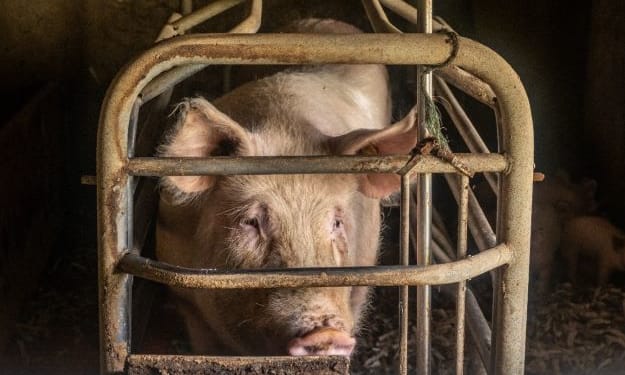Content warning
This story may contain sensitive material or discuss topics that some readers may find distressing. Reader discretion is advised. The views and opinions expressed in this story are those of the author and do not necessarily reflect the official policy or position of Vocal.
The Rise of Sustainable Agriculture: A Global Shift Toward Food Security and Environmental Stewardship
In a world confronted by the dual challenges of feeding a growing global population and mitigating the environmental impacts of agriculture, a transformative shift towards sustainable farming practices is gaining momentum

The Imperative for Sustainable Agriculture
As the world's population surges towards 9.7 billion by 2050, the demand for food is expected to rise by 70%. To meet this growing need, conventional agriculture has historically relied on intensive practices such as monoculture, heavy pesticide use, and large-scale irrigation. While these methods have increased food production, they have also strained natural resources, contributed to greenhouse gas emissions, and led to biodiversity decline.
Sustainable agriculture emerges as a response to these challenges. It is an approach that seeks to balance the need for increased food production with environmental responsibility. Sustainable farming systems prioritize soil health, minimize chemical inputs, optimize resource use, and promote biodiversity, all while ensuring food security and economic viability.
Key Principles of Sustainable Agriculture
Sustainable agriculture encompasses several key principles:
Soil Health: Central to sustainable agriculture is the recognition that healthy soil is the foundation of productive farming. Sustainable practices focus on improving soil health through methods like crop rotation, cover cropping, and reduced tillage.
Water Conservation: Sustainable farming places a premium on efficient water use. Farmers are adopting precision irrigation techniques, rainwater harvesting, and drought-resistant crop varieties to reduce water consumption.
Biodiversity Preservation: Biodiversity is crucial for ecosystem resilience. Sustainable agriculture practices include setting aside natural habitats, planting diverse crops, and using integrated pest management to promote biodiversity.
Reduced Chemical Inputs: Minimizing chemical inputs like synthetic fertilizers and pesticides is a hallmark of sustainable agriculture. Organic farming, for example, emphasizes natural fertilizers and biological pest control.
Crop Resilience: Sustainable agriculture seeks to develop crop varieties resilient to changing climates. This includes breeding for drought tolerance, disease resistance, and enhanced nutritional content.
Global Adoption of Sustainable Agriculture
The adoption of sustainable agriculture practices is gaining traction across the globe:
Europe's Green Deal: The European Union has taken a bold step with its "Farm to Fork" strategy, aiming to make food systems more sustainable. This includes reducing pesticide use, increasing organic farming, and promoting local food production.
Regenerative Agriculture in the United States: Regenerative agriculture, a subset of sustainable farming, is gaining popularity in the United States. It focuses on restoring and enhancing soil health, which can sequester carbon and improve agricultural resilience.
African Agroecology: In Africa, agroecological approaches are being promoted to enhance food security. These approaches emphasize indigenous knowledge, diversified cropping systems, and sustainable land management.
Asia's Sustainable Rice Production: Countries like Thailand and Vietnam are exploring sustainable rice production practices, such as the System of Rice Intensification (SRI), which reduces water and chemical inputs while increasing yields.
Global Certification Standards: Certification programs like Fair Trade and organic certification are helping consumers identify sustainably produced products, promoting responsible consumption.
The Role of Technology
Technology plays a pivotal role in advancing sustainable agriculture:
Precision Agriculture: Tools like GPS-guided tractors and drones allow farmers to optimize resource use, reduce chemical inputs, and enhance crop yields.
Biotechnology: Genetic engineering has the potential to develop crops with improved pest resistance, drought tolerance, and nutritional content.
Big Data and AI: Data analytics and artificial intelligence help farmers make data-driven decisions, from predicting crop diseases to optimizing planting schedules.
Vertical Farming: Urban agriculture is on the rise with vertical farming, where crops are grown indoors using less land and water.
Challenges and Hurdles
Despite the promise of sustainable agriculture, challenges remain:
Transition Costs: Transitioning from conventional to sustainable practices can be costly and challenging for farmers, particularly smallholders with limited resources.
Knowledge Gaps: Farmers need access to information and training to adopt sustainable practices effectively.
Market Access: Sustainable products often face barriers to market access, as they may be priced higher than conventionally produced goods.
Policy Support: Governments need to create policies that incentivize and support sustainable agriculture, including subsidies for sustainable practices and land preservation.
Consumer Demand for Sustainable Food
Consumer demand for sustainably produced food is a driving force behind the shift toward sustainable agriculture. Increasingly, consumers are seeking products that are not only nutritious but also environmentally and ethically produced. The rise of conscious consumerism is prompting businesses to adopt sustainability as a core value, driving positive changes across the food supply chain.
The Way Forward
Sustainable agriculture stands at a critical juncture. It offers a pathway to address global food security challenges while mitigating the environmental impacts of farming. To fully realize the potential of sustainable agriculture, coordinated efforts are needed, including:
Investment in Research: Continued research into sustainable farming practices, crop breeding, and technology is essential.
Education and Training: Farmers must be equipped with the knowledge and skills to adopt sustainable practices effectively.
Policy Alignment: Governments and international organizations should align policies to incentivize and support sustainable agriculture.
Market Access: Mechanisms to ensure fair pricing and market access for sustainably produced products need to be developed.
Consumer Engagement: Continued consumer awareness and engagement are vital to driving the demand for sustainable food.
Sustainable agriculture represents a global shift towards a more responsible and harmonious relationship with the planet. As we navigate the challenges of a changing climate and a growing global population, the choices we make in agriculture today will shape the future of food security and environmental sustainability for generations to come. It is a collective endeavor that encompasses governments, businesses, farmers, and consumers - all working together to nourish the world while preserving the Earth.





Comments (1)
Nice News